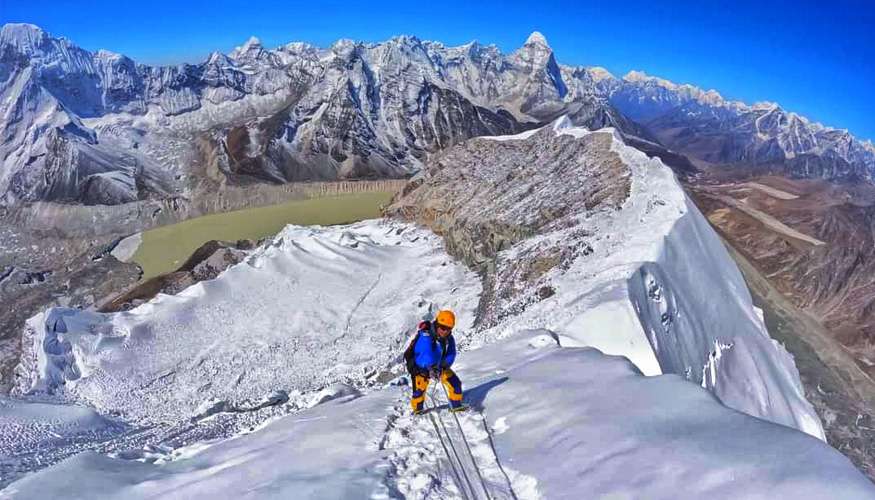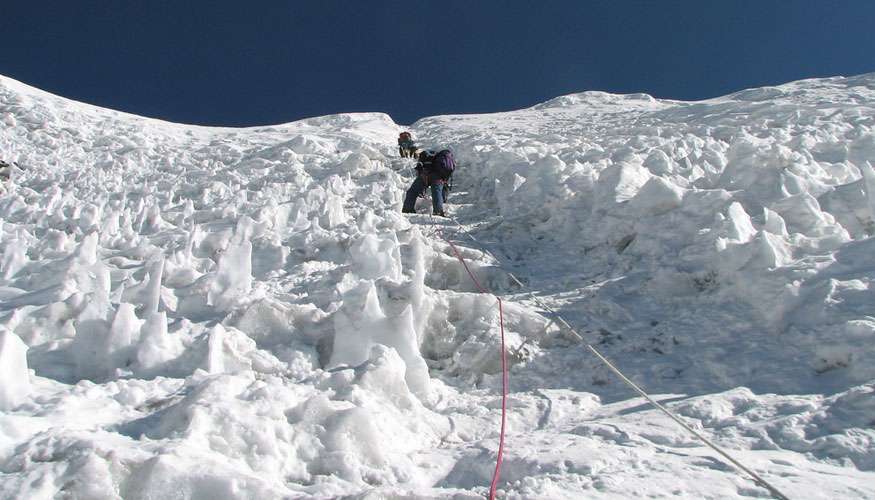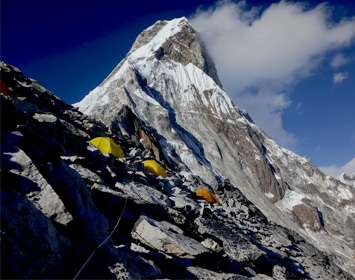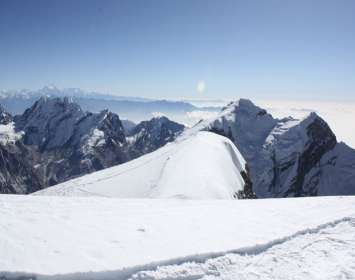Good to Know
Why go on Island Peak Climbing with us?
Climbing Island Peak with us allows you to be in a safe hand and climb with strong support. We provide highly experienced Sherpa guides who will assist you during the climbing. We have climbed Island Peak several times and led many groups successfully, which makes us a perfect travel partner.
How long does it take to climb Island Peak?
To climb to the summit of Island Peak from the base of the peak, it will take around 4 to 5 hours, depending upon your speed and strength. Overall the entire Island Peak Climbing journey can take around 16 to 18 days. You can also customize the itinerary as per your time as well. Get in touch with us to design your dream journey, we will give you full support and great service at an affordable price.
Island Peak Climbing itinerary
A short thrilling flight will take you to the starting point of the trek, Lukla from where you will begin trekking towards Namche Bazar. The trail follows stream and goes through dense forests crossing many streams. From Namche Bazar, you begin climbing through the lush forest of rhododendron and passes through villages like Tengboche, Dingboche, and Chhukung. The trail ascends to Island Peak Base Camp and moves up to the summit of Island Peak.
Best time to go Island Peak Climbing
You can do Island Peak Climbing in spring (March to May) and autumn (October to November). These are the peak months to do climbing in the Himalayas. Stable weather, moderate climate, and clear views make the journey joyous. In the spring, the trail gets bloomed up with beautiful flowers, and spring makes the region warm with beautiful colors.
Island Peak Climbing difficulty
Climbing Island Peak or any peak is difficult. You have to deal with high altitude, low oxygen level, steep snowy slopes, and exposure to cold & direct sunlight. Even though Island Peak Climbing is not challenging in terms of technical climbing, yet you have to walk 6 to 7 hours per day on mixed terrain. You have to be in good physical condition and have strong will-power to go on this adventurous trip. Previous trekking experience is needed to go on Island Peak Climbing.
Altitude Sickness Symptoms & Prevention
Altitude sickness or Acute Mountain Sickness is the major issue that travelers have to overcome during high altitude journey. If your body did not get acclimatized with the elevation then the chances of getting altitude sickness become high. Therefore, it is very important to add enough rest days in between the trek.
Below you can read about symptoms and prevention of altitude sickness:
Symptoms of altitude sickness:-
- headache
- nausea and vomiting
- dizziness
- tiredness
- loss of appetite
- shortness of breath
Prevention of altitude sickness:-
- Include an adequate number of rest days during the trek/climbing
- Avoid climbing more than 300-500 meters a day
- Make sure you're drinking enough water
- Eat a light but high-calorie diet
- Avoid alcohol
- Avoid smoking
- Inform your guide immediately so that he can take proper action on time
- Drop down to lower altitude and rest for a few days until symptoms getaway
Food & Water during Island Peak Climbing
On Island Peak Climbing, you will get meals as per the menu of the lodge. You have the option to choose from Nepali, Indian, Tibetan, and Continental dishes. Rice, curries, soup, porridge, egg, pudding, momo, sandwiches, pasta, chapati, bread, meat, thukpa, etc can be seen on the menu. Likewise, you will also have a good option for confectionery items.
While climbing, you will all the meals will be cooked by our team members who are professionally trained in cooking. We offer a wide range of dishes for camping as well. We also make sure you are getting all the required calories to maintain your energy to climb. Drinking water is available everywhere. Make sure to carry a water purification tablet to double purify water. During camping, we will provide you pure drinking water.
Accommodation during Island Peak Climbing
In the villages, you stay overnight in the lodge, which is run by locals. While staying in the lodge, you will find a similar experience like locals living style. The rooms are generally small and have to be shared with a fellow trekker. A single room is not available most of the time, and if you insist on a single room, then the price will get double. Usually, lodges have both common and private washrooms. We do recommend you to carry a nice sleeping bag with you to keep yourself warm.
During climbing, you stay overnight in a tent. We offer a high-quality single sleeping tent to all the team members, whereas dining tent, kitchen tent, and washroom tent are used on a sharing basis. We carry all the equipment that is needed to survive while staying in camp.
Island Peak Climbing cost
You can find little difference in the cost of the Island Peak Climbing package in every travel company. It is because of the services that the company is providing during climbing. We have professionally designed our Island Peak Climbing itinerary and are also open to the tailor-made itinerary. With us, you will get the most comprehensive cost for the package. To know more about the price, get in touch with us anytime. Also, check our cost includes and excludes section for detailed information.
Environmental Practices
We practice several measures to not damage the environment during our trips. We have planned our trip adopting the best sustainable equipment that we can use for the long term. While returning from the camps, we collect all the garbage and encourage our guests to not leave any waste on the base camps. Likewise, we also suggest our guests use reusable containers for water or any other things. We also work closely with the locals of every region and help them providing earning opportunities.
Island Peak Climbing Packing List
We want you to know that you can rent or buy all the gears in Kathmandu. There are several options from medium range brands to high-end brands for all budget types.
- Clothing
- Sun hat/scarf
- Fleece jacket with wind-Stopper
- Waterproof shell jacket
- Down vest and/or jacket
- Lightweight gloves/Heavyweight gloves or mittens with a waterproof shell outer
- Light and expedition weight thermal bottoms
- Fleece/wool pants
- Waterproof (preferably breathable fabric) shell pants
- Thick, warm wool hiking socks
- Hiking boots with spare laces
- Sunglasses with UV protection
Accessories
- Sleeping bag rated to zero degrees Fahrenheit
- Trekking poles
- Headlamp
- Trek bag-pack
- Basic First Aid Kit
- Daypack
- Thermo-rest sleeping pad
- Water bottles
Climbing Gears
- Climbing harness
- Ice ax
- crampons
- Mountaineering boots
- AscenderDescender/Abseil device
- Rope
- Snow bar
- Ice hammer
- Helmet (optional)
Toiletries
- Quick-drying towel/Small wash towel
- Soap (biodegradable)
- Toothbrush/paste biodegradable)
- Deodorants
- Face and body moisturizer
- Nail clippers
- Small mirror
- Tissue paper/toilet roll
- Anti-bacterial Hand wash
Extra
- Trail Map/Guide book
- Binocular
- Reading book
- Journal & Pen
- Pencils and small notebooks
- Camera with extra batteries




